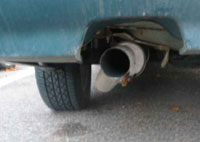Europe proposes car emission limits. Swiss hope to benefit
The European Commission declared war on gas-guzzlers on Wednesday, proposing binding rules to force carmakers to cut carbon dioxide emissions from all new cars sold in the European Union by 2012, arguing the tough measure was needed to fight global warming.

The EU executive's plan, which faces strong opposition from the car industry, foresees the drafting of lower emissions limits - a cut of 18 percent or 130 grams of CO2 per kilometer from current emissions levels - for new cars sold in or imported into the EU by 2012.
EU officials acknowledged the move would likely lead to higher car prices as they try to force Europeans to adopt greener modes of transport amid growing calls for action to save the environment.
"If action is delayed, it will cost far more," said EU Environment Commissioner Stavros Dimas.
Dimas pointed to a U.N. scientific panel report released last Friday which warned that global warming getting worse.
"Winning the battle to prevent dangerous climate change ... will require very substantial reductions of greenhouse gases. All sectors of the economy should participate and transport is very important," he said.
The auto industry called the plan "unbalanced and damaging" to the EU's economy, saying it put at risk 12 million auto sector jobs and that other sectors should also play a part in cutting emissions.
EU Industry Commissioner Guenter Verheugen urged governments to offer subsidies and tax rebates to those buying greener cars.
"We have to be clear about this, this is something which would considerably increase manufacturing costs per car," he said, but added that extra costs "will be more than balanced by the fact that cars will have greater fuel efficiency."
The plan also calls for increased use of biofuels and cleaner fossil fuels, meant to reduce current car emission levels by 25 percent. It also calls for added research to get the level down to 95 grams per kilometer by 2020. Current levels of average car CO2 emissions are around 162 grams per kilometer.
Alan Lloyd, former secretary of the California Environmental Protection Agency said the EU plan could set a global example.
"Europe sets the tone for the developing world," he said in a telephone interview from Washington, D.C.
"I'm pleased that they realized that regulations are a necessary part in light of the U.N. panel report, which shows again with clarity that action is necessary," said Lloyd, who now heads the International Council on Clean Transportation.
Legislation in the U.S. state of California, which is leading U.S. vehicle emission cuts, foresees a 128-gram limit by 2016, while in Japan carmakers have to cut emissions to 140 grams, the AP reports.
Switzerland sees the latest European Union proposal to cut car emissions as an opportunity to give fresh impetus to its environmental policy.
Switzerland does not have a particularly good record on vehicle emissions, with a high number of vehicles that pollute more than the EU average. According to the Swiss association of car importers, new cars in Switzerland emit an average of 190 grammes per kilometre.
For Michael Kaufmann, deputy director of the Federal Energy Office, the new EU offensive is extremely welcome.
"The proposal from Brussels offers an opportunity for Switzerland to make headway," he told Swiss radio.
To tackle the problem the Swiss authorities are studying the possibility of imposing higher taxes on imported cars that guzzle petrol and favouring more ecological models, swissinfo.org reports.
Source: agencies
Prepared by Alexander Timoshik
Pravda.ru
Subscribe to Pravda.Ru Telegram channel, Facebook, RSS!



